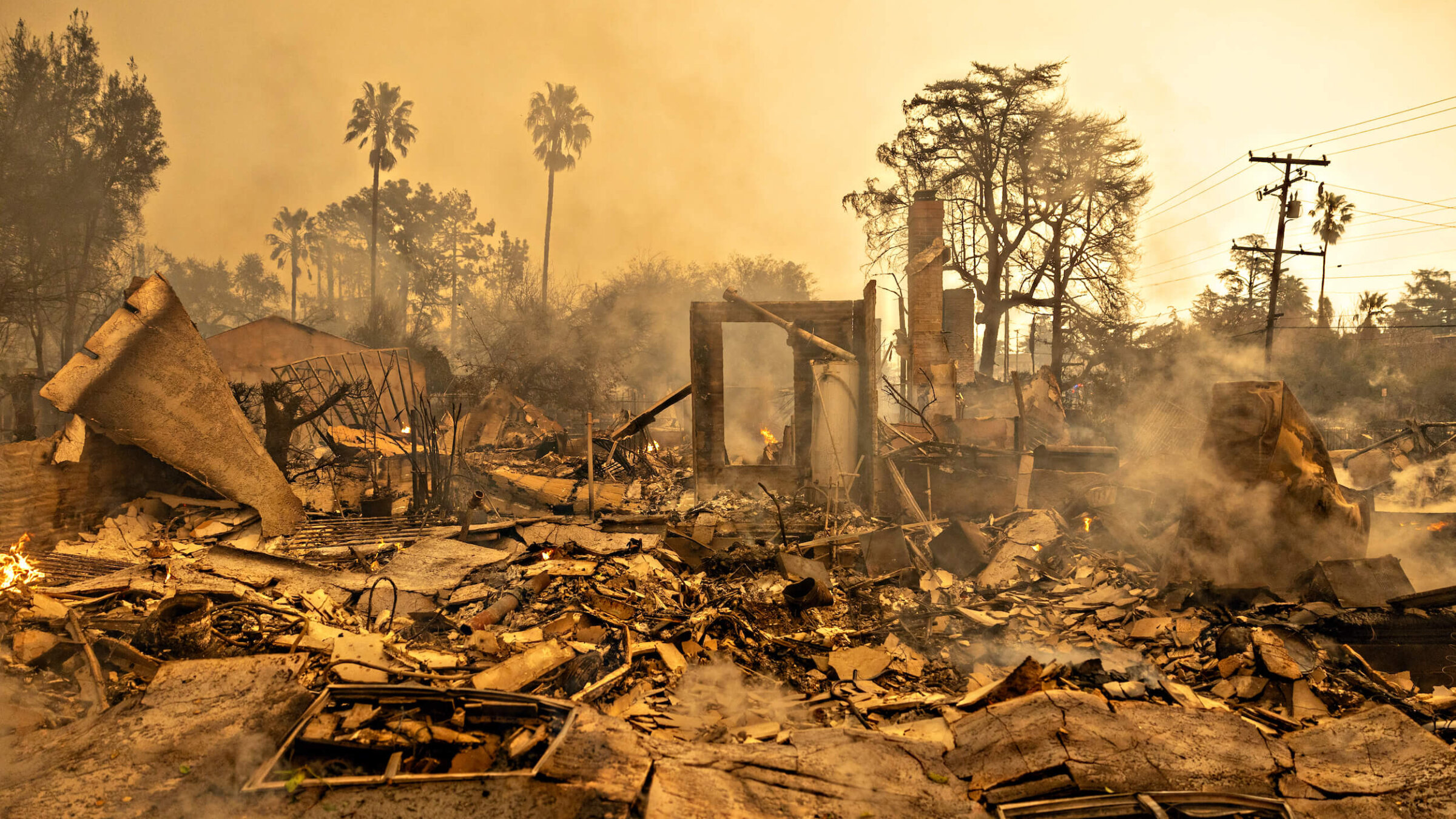Jews excel at collective organizing. The LA fires are a call to rally resources to fight climate change
Catastrophic weather events are coming to define our lives, but it’s not too late for change

The remains of a home lost in the Eaton fire Altadena, Califonia. Photo by Jason Armond / Los Angeles Times / Getty Images
The devastating images of wildfires coming out of the Los Angeles area right now are apocalyptic. Entire buildings up in flames. Cars abandoned on the highway as drivers flee the encroaching inferno. High winds whipping the blazes ever higher, and carrying embers and sparks into new areas.
Southern California’s Jewish community, the second largest in the United States, is reeling. At least two synagogues have been damaged or destroyed. Schools have burned to the ground. Family homes have been destroyed. Those who haven’t been forced to flee are scrambling to help others find shelter, clothing, and food — and waiting anxiously to see what direction the winds blow.
Thousands of places that offer shelter and sources of connection — homes, schools, businesses, houses of worship — have been reduced to sticks and ashes.
This is horrific and heartbreaking. And, terrifyingly, climate events of similar devastation are happening more and more often, in all parts of the globe and in every corner of our country. In September 2024, Hurricane Helene blasted through the southeastern U.S., killing at least 246 people and causing more than $124 billion in damages; less than two weeks later, Milton, a Category 5 hurricane, slammed into Florida, causing 35 fatalities and $85 billion in damages. 2024 also brought multiple extreme heat domes in several U.S. states, causing thousands of deaths.
In Jewish tradition, fire is seen as both a holy, transformational force — as in the story of the burning bush — and a destructive source of punishment, as experienced by the sons of Aaron, who bring and then are consumed by a “strange fire.” We know this to be true from our own personal experiences. Just last week we kindled candles to celebrate the miracle of Hannukah, and this week we are ravaged by wildfires. Fire is one of the many forces that can be used for blessing or for curse. We are called, in this time, to use our collective power to work toward blessing.
It is time for us to accept the truth that, as a result of human-caused climate change, nature is now posing grave dangers no matter where we live.
And just as we created the conditions that unleashed these horrific fires, so we must act to envision and realize a different future.
2024 was the hottest year on record, defeating the previous record set by 2023. This shocking, nonstop rise is a direct result of carbon emissions from burning fossil fuels, which trap the sun’s heat inside the atmosphere, and warm the land, air, and water. There is a clear line between that increasing heat and the devastation of Los Angeles: Hotter conditions, in addition to robbing the region of rainfall, have whipped up hotter and more intense winds, with the annual Santa Ana winds fanning the flames and inhibiting firefighters.
We must use our power and agency to demand that we change course.
On a large scale, we need to keep up demands on policymakers at all levels of government — particularly on a state and local scale, as the incoming Republican-led federal government is unlikely to prioritize climate initiatives. We must demand our leaders focus on transitioning our society away from reliance on fossil fuels — including by holding the energy industry accountable for the damage caused by severe weather events — and investing in clean energy solutions, including subsidies for renewables and by building out clean energy facilities with good jobs.
At the state and local levels, real change is eminently possible: Even in these terrifying moments, hope is not just essential, but justified. Already, Jewish climate activists have played an important role in winning significant policy advances. In the past year, California preserved a law prohibiting oil drilling near homes and schools and passed a $10 billion bond to fund climate projects, wildfire prevention, and clean drinking water.
And just last month, New York passed the Climate Change Superfund Act, which holds fossil fuel companies responsible for damage from extreme weather and provides funding for climate-resilient infrastructure.
Now is not just the time to rally support for the communities being ravaged by these ferocious fires. It is also the time to commit to not forgetting these tragedies, and instead moving forward intent on envisioning and building a different future — one that systematically reduces the risk of this kind of rampant and devastating destruction.
It is too late to keep climate change from happening, but it is not too late, in the language of our High Holiday liturgy, “to avert the severity of the decree” and avoid the worst of climate devastation.
In these coming weeks, we will read in the Torah about our people’s struggle to rise up against Pharaoh and the atrocities of slavery, to take courageous action, and journey to freedom and a new land. The Jewish community knows how to come together in crisis. We also know how to build collective power to make lasting change. Now is a time that calls for both.
















